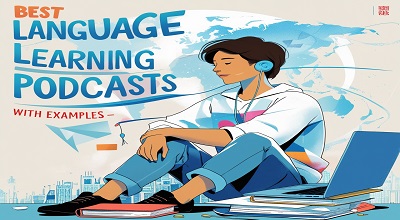Best Language Learning Podcasts
Best Language Learning Podcasts: Learning a new language has never been easier, thanks to the abundance of language learning podcasts available today. Whether you’re a beginner or an advanced learner, podcasts offer a flexible and engaging way to improve your listening, speaking, and comprehension skills. In this comprehensive guide, we’ll explore the best language learning podcasts with examples to help you choose the right one for your needs.
Language Learning Podcasts
Podcasts have revolutionized language learning by providing accessible, on-the-go lessons that fit into busy schedules. Unlike traditional classroom settings, podcasts allow learners to immerse themselves in real-life conversations, cultural insights, and structured lessons at their own pace.
Many language podcasts include:
- Beginner to advanced lessons
- Native speaker dialogues
- Grammar and vocabulary breakdowns
- Cultural tips
- Interactive exercises
Benefits of Using Podcasts for Language Learning
Flexibility & Convenience
- Listen anytime, anywhere—commuting, exercising, or relaxing.
Improved Listening & Pronunciation
- Exposure to native speakers enhances comprehension and accent.
Structured Learning
- Many podcasts follow a curriculum, making progression easy.
Cultural Context
- Learn idioms, slang, and cultural nuances not found in textbooks.
Cost-Effective
- Most podcasts are free or affordable compared to courses.
Best Language Learning Podcasts (With Examples)
Spanish
1. Coffee Break Spanish
- Level: Beginner to Intermediate
- Format: 15-20 minute lessons with explanations and dialogues.
- Example Episode: “Ordering Food in a Spanish Restaurant” – Teaches key phrases like “Quisiera pedir…” (I would like to order…).
2. Duolingo Spanish Podcast
- Level: Intermediate
- Format: Real-life stories with bilingual narration.
- Example Episode: “El Héroe de la Montaña” – A gripping survival story with slow Spanish and English translations.
French
1. Learn French by Podcast
- Level: Beginner to Advanced
- Format: Dialogues with grammar breakdowns.
- Example Episode: “At the Train Station” – Covers phrases like “Un billet pour Paris, s’il vous plaît.” (A ticket to Paris, please.)
2. InnerFrench
- Level: Intermediate
- Format: Monologues on culture, history, and society.
- Example Episode: “Pourquoi les Français font la grève?” (Why do French people strike?)
German
1. Slow German
- Level: Intermediate
- Format: Slow-spoken German with transcripts.
- Example Episode: “Oktoberfest” – Explores the famous festival with clear pronunciation.
2. Deutsch – Warum Nicht?
- Level: Beginner
- Format: Story-based lessons with exercises.
- Example Episode: “Im Hotel” (In the Hotel) – Teaches booking and checking-in phrases.
Mandarin Chinese
1. ChinesePod
- Level: All levels
- Format: Dialogues with vocabulary explanations.
- Example Episode: “How to Bargain in Chinese Markets” – Teaches phrases like “Tài guì le!” (Too expensive!)
2. Slow Chinese
- Level: Intermediate
- Format: Cultural topics spoken slowly.
- Example Episode: “The Mid-Autumn Festival” – Discusses traditions and vocabulary.
Japanese
1. JapanesePod101
- Level: Beginner to Advanced
- Format: Themed lessons with hosts.
- Example Episode: “10 Must-Know Phrases for Beginners” – Covers greetings like “Konnichiwa” (Hello).
2. Nihongo con Teppei
- Level: Beginner to Intermediate
- Format: Short, casual conversations.
- Example Episode: “Talking About Hobbies” – Uses simple sentences like “Watashi wa eiga ga suki desu.” (I like movies.)
Italian
1. Coffee Break Italian
- Level: Beginner
- Format: Step-by-step lessons.
- Example Episode: “Introducing Yourself” – Teaches “Mi chiamo…” (My name is…).
2. Italy Made Easy
- Level: Intermediate
- Format: Grammar and conversation tips.
- Example Episode: “Common Italian Gestures” – Explains cultural body language.
English
1. The English We Speak (BBC)
- Level: Intermediate
- Format: Idioms and slang.
- Example Episode: “To Hit the Sack” – Means “to go to bed.”
2. ESL Pod
- Level: All levels
- Format: Slow English with explanations.
- Example Episode: “Going to the Doctor” – Teaches medical vocabulary.
Other Popular Languages
- Russian: RussianPod101
- Korean: Talk To Me In Korean
- Portuguese: Practice Portuguese
- Arabic: ArabicPod101
How to Maximize Your Learning with Podcasts?
Active Listening Techniques
- Repeat phrases aloud.
- Take notes on new vocabulary.
- Shadow (mimic) the speaker’s pronunciation.
Supplement with Other Resources
- Use flashcards (Anki, Quizlet).
- Join language exchange apps (Tandem, HelloTalk).
- Watch movies or YouTube in the target language.
Consistency is Key
- Dedicate 15-30 minutes daily.
- Revisit difficult episodes.
Latest Trends in Language Learning Podcasts
- AI-Powered Podcasts: Personalized learning with chatbots.
- Interactive Podcasts: Quizzes and exercises within episodes.
- More Niche Topics: Business, travel, and tech-focused language lessons.
Conclusion
Language learning podcasts are a powerful, flexible, and engaging way to master a new language. Whether you’re learning Spanish, French, Mandarin, or any other language, there’s a podcast tailored to your level and interests. Start listening today and immerse yourself in a new language!
FAQs
Are language learning podcasts free?
Many are free (e.g., Coffee Break series, Duolingo), but some premium versions offer extra features.
Can I become fluent just by listening to podcasts?
Podcasts help with listening and vocabulary, but speaking practice (via apps or tutors) is essential for fluency.
Which podcast is best for beginners?
Coffee Break series and LanguagePod101 are great for structured beginner lessons.
How often should I listen to podcasts?
Daily listening (even 15-20 minutes) yields the best results.
Do podcasts help with pronunciation?
Yes! Mimicking native speakers improves accent and fluency.
Free Download Link: Hungry Dragon MOD APK
